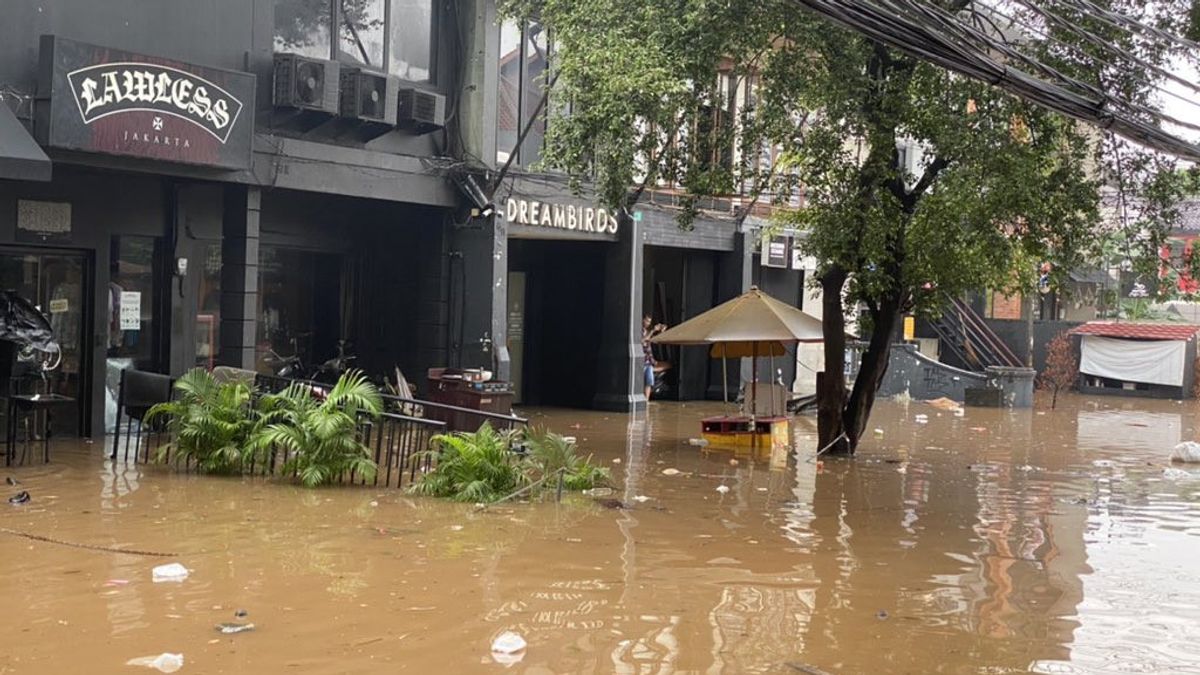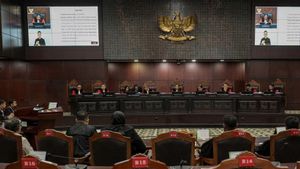JAKARTA - "Lawless Jakarta finally gets flooded. Usually, the water reaches the front of the road," wrote Arian Arifin Wardiman alias Arian 13. Arian then threw a class action discourse, demanding that the DKI Jakarta Provincial Government compensate for the business losses that were affected by the flood. What is class action and why is it important to understand this concept as awareness of citizens' rights?
The discourse is just that, said Arian when calling VOI, Monday, February 22. "That's just the discourse being rolled out. I don't know how it will be later."
What is clear, this year's flooding is getting worse for business. For example, Lawless Burger Bar Kemang. Last year the flood stopped, indeed. But only up to the front of the road. Didn't get into the shop area. "Many of my friends (businessmen in Kemang) are still affected," said Arian.
Asked about the losses due to flooding at Lawless Burger Bar Kemang, Arian could not answer. The team is currently cleaning up the mess and checking for losses. What is clear, said Arian, Lawless Burger Bar Kemang must resume operations as soon as possible to reduce losses.

For Arian himself, one flood this time directly hit three of his business units. Apart from Lawless Burger Bar Kemang, bicycle equipment shops, Life Behind Bars and Duck Down Pizza Party are also affected. Arian said, the Duck Down Pizza Party was the one with the worst losses.
"Lawless Jakarta has invested in DDPP ... DDPP was forced to close when there was the first PSBB which was allowed to open until 7 o'clock. At that time we had not opened for long," said Arian.
"DDPP has the worst losses ... Not yet (specific amount of losses). But big," he added.
Lawless Jakarta Store & Lawless Burgerbar Kemang are closed today until the flood recedes. Lawless Burgerbar Menteng and Lawless Burgerbar Capsules Bintaro, Cibubur & Lawless Dogbar are open as usual. 🙏🏼 pic.twitter.com/2jAwdgfTdT
- 🐺 (@aparatmati) February 20, 2021
Apart from Arian, the class action discourse was also thrown by the Jakarta City Citizens Forum (FAKTA). They advised residents to sue the DKI Jakarta Provincial Government for its poor flood handling and anticipation skills.
"The residents should sue the Jakarta Provincial Government for handling this messy flood this week. The essence of the lawsuit that can be carried out within the provincial government is not preparing, conducting early warnings and emergency assistance to help residents who are flood victims," said FAKTA Chairman Azas Tigor Nainggolan in a written statement, Saturday, February 20.
According to Azas' analysis, the flood in Jakarta this time was caused by a drainage (water channel) dysfunction. Many waterways in Jakarta are clogged and unkempt, so that when it rains heavily, the water cannot flow and instead stagnates.

And the task of maintaining waterways, said Azas, is the responsibility of the DKI Provincial Government. In this context, Azas said that the DKI Jakarta Provincial Government was not working well. Azas also highlighted the DKI Pemprov's inability to provide early warning to residents.
"This means that the provincial government and its governors have yet to prepare an early warning system and an emergency response system to help residents. This carelessness can be questioned and legally sued by flood victims," he said.
What is class action and why is this awareness importantIn general and simple terms, class action is the space provided by the constitution for one or several people representing a wider group to sue another party, which in this discussion is the DKI Pemprov as the policy maker. In Indonesia, the provisions of the class action procedural law are specifically regulated in the Supreme Court Regulation (Perma) Number 1 of 2002 concerning Class Action Action Procedures.
There are five stages in the class action. First, filing a lawsuit file. At this stage the plaintiff must involve a number of people who have experienced the same thing. Perma 1/2002 does not set a limit on the number of people in the group to meet formal requirements.
However, quoted by The Conversation, civil law expert, M Yahya Harahap, is of the opinion that if the number of group members is five to ten people, then it is more appropriate to use ordinary lawsuits because the examination process is simpler than the class action route.
At this stage the plaintiffs' group must also ensure that their claims are consistent with the same legal basis. In addition, group representatives must also have honesty and seriousness in protecting the interests of the group being represented.
[/ read_more]

The second stage is certification. The court will check whether the group's representatives have received permission to represent them. The court will also check the requirements for filing a lawsuit, as regulated by Perma 1/2002 have been fulfilled as well as ascertain whether the class action procedure is right for the lawsuit.
If everything fits and is declared valid, then the lawsuit will go to the third stage. At this stage the judge will order the plaintiffs to notify the class members. This stage is important for group members to determine whether they want to participate and be bound by the decisions in the case or not. There is a certain amount of time for the plaintiff to complete this stage.
The next stage is examination and verification. This process is the same as in a typical civil case. If on the day of the first trial the plaintiff is not present, while the defendant or his legal representative comes, then the lawsuit is dropped and the plaintiff is punished to pay the court fee.
If on the first trial day and on the second trial day the defendant does not come while the plaintiff or plaintiffs always come, then the case will be decided without the presence of the defendant or verstek. Then, the fifth and final stage is the implementation of the verdict.
Public policy expert from Trisakti University, Trubus Rahadiansyah, said it was important for the public to realize their rights through class actions. In terms of policy making by the government, for example. The high awareness of class action will "give one consequence of a wrong policy," Trubus told VOI, Monday, February 22.

[/ read_more]
In Indonesia, awareness of the rights to class action suits is actually not very low. There are several precedents that prove it. In fact, in the context of flooding, last year a number of groups filed a class action lawsuit against the DKI Jakarta Provincial Government.
However, class action lawsuits often fail to be won by community groups, where one of the causes is the inadequate lawsuit in evidence and testimony. In addition, many law enforcement officers also place class action suits as trivial things to fight for. In the aftermath, the interests of the pawned community.
"The real awareness is high. But they are often confronted by the procedural law itself. So this society wants to be simple, simple, efficient effect. Sometimes this procedural law, in terms of proof, testimony, turns the community into a victim by law enforcement officials. not serious. Often, "said Trubus.

However, realizing this lawsuit right is very important. Legal awareness in this context is the power to oversee the running of government. In the context of flooding in Jakarta, for example.
However, the DKI Pemprov has a very long learning room regarding flood management in Jakarta. That is from the historical and precedent side. In terms of competence, the DKI Provincial Government is not incompetent. They have sufficient resources, they have adequate tools, especially regarding the budget.
"In Kemang, for example. That's the connection with the Ciliwung River. It can be done dredging the Ciliwung River. Last year's flood should have become a lesson, where the DKI Jakarta Provincial Government can take precautions," Trubus.
"This is the time for the policy makers to take responsibility. Because the budget regarding the flood has increased significantly. This is, but the floods are even more devastating now ... DKI Jakarta has no reason for the floods to not be handled. There is only political will left. This Governor "It's been too much talk. It's been three years in office but the handling is not significant," added Trubus.
BERNAS Others[/ read_more]
The English, Chinese, Japanese, Arabic, and French versions are automatically generated by the AI. So there may still be inaccuracies in translating, please always see Indonesian as our main language. (system supported by DigitalSiber.id)









